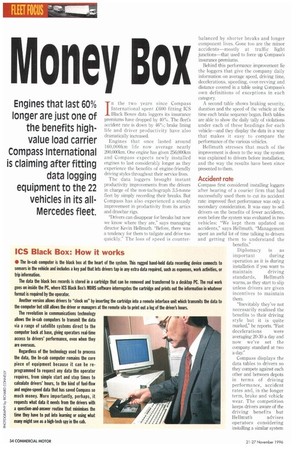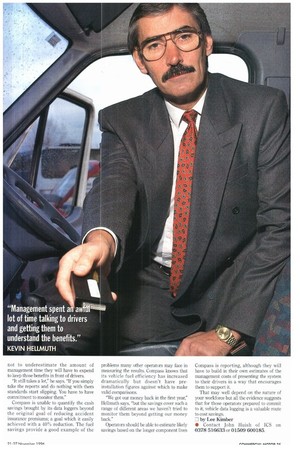Money Box
Page 36

Page 37

If you've noticed an error in this article please click here to report it so we can fix it.
In the two years since Compass International spent £600 fitting ICS Black Boxes data loggers its insurance premiums have dropped by 40%. The fleet's accident rate is down by 46%; brake lining life and driver productivity have also dramatically increased.
Engines that once lasted around 160,000km life now average nearly 200,000km. One engine has given 256,000km and Compass expects newly installed engines to last considerably longer as they experience the benefits of engine-friendly driving styles throughout their service lives.
The data loggers brought instant productivity improvements from the drivers in charge of the non-tachograph 3.5-tonne fleet by simply recording their breaks. But Compass has also experienced a steady improvement in productivity from its artics and drawbar rigs.
"Drivers can disappear for breaks but now we know where they are," says managing director Kevin Hellmuth. "Before, there was a tendency for them to tailgate and drive too quickly." The loss of speed is counter
balanced by shorter breaks and longer component lives, Gone too are the minor accidents—inostly at traffic light junctions—that used to force up Compass's insurance premiums.
Behind this performance improvement lie the loggers that give the company daily information on average speed, driving time, decelerations, speeding, over-revving and distance covered in a table using Compass's own definitions of exceptions in each category A second table shows braking severity, duration and the speed of the vehicle at the time each brake sequence began. Both tables are able to show the daily tally of violations under each of these headings for each vehicle—and they display the data in a way that makes it easy to compare the performance of the various vehicles.
Hellmuth stresses that much of the improvement is down to the way the system was explained to drivers before installation, and the way the results have been since presented to them.
Accident rate
Compass first considered installing loggers after hearing of a courier firm that had successfully used them to cut its accident rate: improved fleet performance was only a secondary consideration. It was easy to sell drivers on the benefits of fewer accidents, even before the system was evaluated in two vehicles: "We kept them updated on accidents," says Hellmuth. "Management spent an awful lot of time talking to drivers and getting them to understand the benefits."
Diplomacy is as important during operation as it is during installation if you want to maintain driving standards, Hellmuth warns, as they start to slip unless drivers are given incentives to maintain them.
"Inevitably they've not necessarily realised the benefits to their driving style but it is quite marked," he reports. "Fast decelerations were averaging 20-30 a day and now we've set the company standard at two a day."
Compass displays the data tables to drivers so they compete against each other and between depots in terms of driving performance, accident rates and, in the longer term, brake and vehicle wear. The competition keeps drivers aware of the driving benefits but Hellmuth advises operators considering installing a similar system not to underestimate the amount of management time they will have to expend to keep those benefits in front of drivers.
"It still takes a lot," he says. "If you simply take the reports and do nothing with them standards start slipping. You have to have commitment to monitor them."
Compass is unable to quantify the cash savings brought by its data loggers beyond the original goal of reducing accident insurance premiums; a goal which it easily achieved with a 40% reduction. The fuel savings provide a good example of the problems many other operators may face in measuring the results. Compass knows that its vehicle fuel efficiency has increased dramatically but doesn't have preinstallation figures against which to make valid comparisons.
"We got our money back in the first year," liellmuth says, "but the savings cover such a range of different areas we haven't tried to monitor them beyond getting our money back."
Operators should be able to estimate likely savings based on the longer component lives Compass is reporting, although they will have to build in their own estimates of the management costs of presenting the system to their drivers in a way that encourages them to support it.
That may well depend on the nature of your workforce but all the evidence suggests that for those operators prepared LO Commit to it, vehicle data logging is a valuable route to cost savings.
by Lee Kimber
• Contact John Huish of ICS on 0378 516633 or 01509 600185.




















































































































































































































